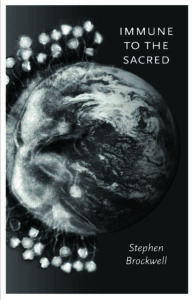Immune to the Sacred, Stephen Brockwell’s seventh full-length poetry collection, is the natural evolution of one of Ottawa poetry’s most beloved veteran voices. Published six years after the Archibald Lampman Award-winning All of Us Reticent, Here, Together, in one of the longest gaps between releases for Brockwell, Sacred sees the author explore his childhood, his place in the Ottawa community, and a wary uncertainty towards the future.

A signature of Brockwell’s work is his delight in the sounds and aural textures of the written word. He ruminates on each syllable, inviting us to explore the mouthfeel of each word in a stanza, taste different permutations of a passage. In Immune to the Sacred, this hallmark is on fine display, as in “San Bernardino Freeway, Very Late”: “You slur, cart-driven cur. Spurned / shambolic goblin.” Or in Mouth, a long piece: “If mouth is a synecdoche for you, / your mouth has // no limit – the body containing it / a torus – a ring in the nose / of a bull in the social // register of gifts / snorting its last breath.”
Immune to the Sacred’s title comes from a quote from Salman Rushdie, included as an epigraph at the front of the collection: “The moment you say that any idea system is sacred […] immune from criticism, satire, derision or contempt, freedom of thought becomes impossible.” It could just be my read, but I don’t feel much Rushdie here, nor much iconoclastic spirit. The only spirit I feel drawn to in Sacred is the spectre of climate change, which haunts this collection.
Brockwell speaks frankly about the uncertain future throughout, often through a collection of ekphrastic poems on “Still(s) From Declassified Nuclear Test Film(s)”, woven through Sacred. In “Let’s Face It,” we are dragged into blinding light: “Her hair. / Say that – all the voices / murmur. // Skin tone / adjustments I can’t / imagine – who could? / No categories for that / declassification, too much / gamma / to see it.” The creeping theme of climate crisis is most overtly developed in a standout piece from this collection, “Sunken Monuments,” which describes the last man on earth in a boat on the eternal sea, smoking the last cigarette, drinking the last beer: “Soon everything will happen above ground, / in the ocean that covers everything – / a fluid inner space seething with predators.”
Brockwell writes at length of his relationship to Ottawa in these poems: in “Saint Patrick” and “If You Want To Help, Listen,” for example, he grounds us in vivid snapshots of the old Beechwood quarter of Lowertown and Vanier. But ever throughout, a thread nags at the reader’s ear: all this will be lost, the collection seems to imply, unless we implement decisive climate action as soon as possible.
While some poets tackle climate crisis with an urgent voice in their work, it’s hard not to read Brockwell’s tone in this collection as wistful, instead. With the pieces on climate change and nuclear tests in mind, Immune to the Sacred seems to lead us in longing for a world-that-was. “Sunken Monuments,” to that end, closes with a camera-flash of a stanza for longing: “I should clarify. It was not a man on a boat. / In a boat, it was a photograph of a man / screaming. The loudest photograph ever snapped.”
Bios
Liam Burke
Liam Burke (he/him/himbo) lives in Ottawa, Canada, on unceded Algonquin Anishinaabe land. He is most recently the co-author of Orbital Cultivation with Manahil Bandukwala (Collusion, 2021) and machine dreams with natalie hanna (Collusion, 2021) which was shortlisted for the 2022 bpNichol Chapbook Award. His poem “Can we locate souls in space? The pairing problem, solved”, co-written with Manahil Bandukwala, was shortlisted for the 2022 Austin Clarke Award. [updated January 2023]

